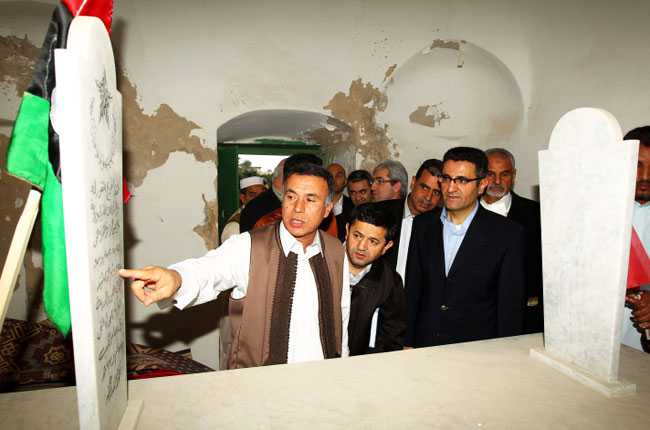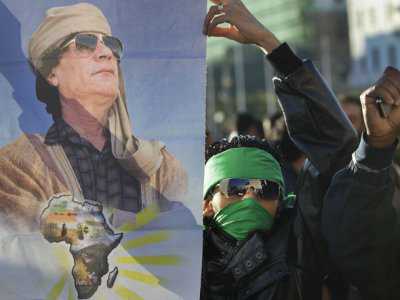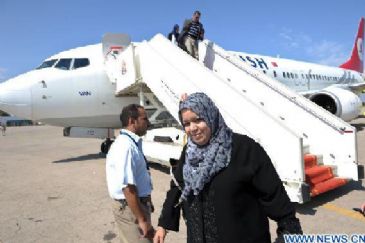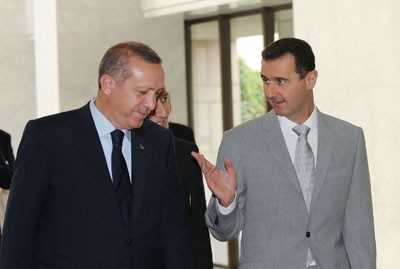| By Jeremy Salt – Ankara
The report just issued by the UN Human Rights Council’s ‘independent international commission of inquiry on the Syrian Arab Republic’ is now being passed along the line to the UN Security Council, with the recommendation by the UN Human Rights Commissioner, Navi Pillay, that the Syrian government be referred to the International Criminal Court for prosecution.
In its terms of reference the commission describes itself as a ‘fact-finding body’ based on the standard of ‘reasonable suspicion’. Yet if there is anything that characterizes this document, it is the lack of attention to fact. The report is based on accusations, allegations and claims against the Syrian government which it does not even attempt to verify. It repeats the claim that the Syrian government’s security forces are responsible for the deaths of 3500 people – the figure usually given – when there is strong prima facie evidence that a large number of the dead, civilians as well as soldiers, have been the victims of armed gangs operating across the country. It does not even say where it picked up this figure, since increased to 4000 by Navi Pillay, or whether it has any independent evidence that it is accurate.
Two central questions needed to be dealt with if this commission wanted to get at the facts. First, how much truth is there in the allegations being made against the Syrian government and its security forces? Here the commission records the allegations but makes no attempt to verify them. Thus the fact remains unknown. Second, how much truth is there in the allegations made by the Syrian government? Here the commission does not even deal with the allegations. Despite this bias, the result is the same: the fact remains unknown.
The commission says it interviewed 223 victims and witnesses of alleged human rights violations, ‘including civilians and defectors from the military and security forces’. It does not say who these people are, where it got their names from, why they were chosen and who covered the costs of their travel and accommodation. It indicates that other sources of its information include ‘non-government organizations, human rights defenders, journalists and experts’. As this same group is the source of many of the unsubstantiated if not patently false accusations (i.e. dead people who have turned up alive) appearing in the mainstream media, it is obviously important to know precisely which organizations and individuals helped the commission and what the information was that they supplied, but the commission does not say.
The commission regrets that the Syrian government, ‘despite many requests’, failed to engage in dialogue ‘and grant the commission access to the country’. But as the Syrian government points out, in a letter printed as an annex to this report, it had established its own Independent Special Legal Commission, with sub-commissions operating across Syria since the end of March, and therefore would not be able to provide the UN commission with the material it wanted until it had concluded its own inquiries. However, because it could not accommodate itself to the commission’s timetable, it is accused of failing to cooperate.
On September 12 the president of the Human Rights Council (Laura Dupuy Lasserre) appointed three ‘high level experts’ as members of the commission of inquiry: Paulo Pinheiro (chairman), Yakin Ertürk and Karen Koning AbuZayd. They were required to produce their report by the end of November, with an update to be handed in by March, 2012. There is no indication of why the end of November was chosen for the deadline and not December or January, giving the commission more time to investigate the allegations being made. The time frame was extremely constricted given the work load. Within the space of six weeks (end of September to the middle of November), 223 witnesses were interviewed and a report prepared. The commission’s mandated task was ‘to investigate all alleged violations of international human rights law since March 2011 in the Syrian Arab Republic, to establish the facts and circumstances that may amount to such violations and of the crimes perpetrated and where possible to identify those responsible with a view of ensuring that perpetrators of violations, including those that may constitute crimes against humanity, are held accountable’. This clearly could not be done in six weeks. The apparent rush to get the report out will raise questions in many minds about timing, given the way in which the net is being closed around the Syrian government by those who want to bring it down.
The commission presents one side of the story throughout. For virtually every claim it makes there is a counter narrative which it ignores. One such claim involves the use of snipers. The commission says or implies that they were state security forces. There is countervailing evidence of armed civilians shooting at demonstrators to throw the blame on to the state. Perhaps there is truth in both versions, but both versions needed to be considered. The fact remains that the identity of these snipers is not known.
The report alleges that roadblocks and security checks were set up to prevent people from joining demonstrations but makes no mention of allegations of roadblocks being set up by armed gangs and the consequent kidnapping and killing of civilians. It refers to killings and arrests at Jisr al Shughur but not the evidence of the massacre of soldiers and civilians around the town in July: even if only prima facie it deserved to be considered. It produces claims of torture and killing ‘reportedly’ taking place in Homs military hospital ‘by security forces dressed as doctors and allegedly acting with the complicity of medical personnel’. Such a serious charge surely needs more to back it up than ‘reportedly’. The report mentions the raid on a mosque in Dar’a early in the protest movement but not the stockpile of weapons found there. It refers to the torture and murder in custody of two teenage boys and claims that up to November 9, ‘reliable sources’ indicated that 256 children had been killed by state forces. This is such a serious accusation that some corroborative evidence was needed but there is nothing, not the name even of one of these children and not the circumstances in which they were allegedly killed.
It quotes a ‘defector’ (no evidence that this person actually is one) as being told by his commander to ‘disperse the crowd or eliminate everybody including children’. There is no supporting evidence for this accusation. The state security forces are accused of rape but there is no mention of the cases of rape reported by the Syrian authorities to have been committed by armed gangs as part of their project to terrorize and intimidate the civilian population. The army is accused of using tanks and heavy weapons against residential buildings. These accusations are denied by the government. Furthermore, if they were used, were the civilians inside those buildings armed and shooting at the army, as seems to have been the case at Homs and probably elsewhere? The commission does not mention the use of heavy weapons by armed men against the army. Apparently it has not seen the videos of the charred bodies of soldiers lying beside burnt-out tanks. The commission’s statement that it is ‘aware of acts of violence committed by demonstrators’ is a minor point besides the violence of the armed gangs. The substantial body of evidence of their crimes surely needed to be considered if the human rights of all Syrians and not just those who have died at the hands of state security forces are to be taken into account.
In short, this report does not even meet its own ‘lower standard of proof’. In fact, and this seems to be the only fact insofar as this report is concerned, there is little proof of anything. The commission perhaps needed to be reminded that the ‘defectors’ and the Syrian National Council do not represent the Syrian people. Bashar al Assad’s personal popularity plays out well for his government amongst a normally skeptical people. His face has been the focal point of demonstrations of support by millions of people in recent months. If anything, sanctions imposed by the US, the EU, the Arab League and Turkey, along with the constant threat of force, seem to have strengthened public support for Bashar and his government. The commission certainly would have had no difficulty in finding Syrians prepared to come to Geneva to tell another side of the story. Apparently there was no room for them and no interest in what they had to say.
We have just seen what has been done to Libya in the name of human rights and the ‘responsibility to protect’. Uncounted thousands of Libyans were killed in eight months of bombing and missile attacks by French, British and American warplanes. There is prima facie evidence that war crimes were committed but there is not even the suggestion that someone will be held accountable. Further back stands Iraq, invaded in 1991 and then subjected to a decade of sanctions which ended the lives of about one million Iraqis, including hundreds of thousands of children. The second war launched in 2003 brought the overall civilian death toll since 1991 to somewhere between 1.5 and two million Iraqis. Again, prime facie evidence of war crimes and crimes against humanity without any of the perpetrators being punished. The kind of lies told before the attacks of 1991 (babies being thrown out of their incubators in Kuwait) and 2003 (weapons of mass destruction) were duplicated in the propaganda war which preceded the aerial assault on Libya this year (mass killing and Viagra-fuelled rape).
To their eternal shame, the Arab League and governments which sell themselves on their Muslim credentials took part in or came in behind this war on a Muslim country by three non-Muslim governments. Now a third Arab country is being laid out on the chopping board, not in North Africa but at the very heart of the Middle East. The US, France, Britain and their Arab allies can sense that a momentous victory is at hand and they are pushing as hard as they can, using every weapon at their disposal. At the end of the road lies the possibility of armed intervention through the declaration of a ‘no fly’ zone and a cross-border operation to establish a ‘buffer zone’ or what the French Foreign Minister, Alain Juppé, prefers to call a ‘humanitarian corridor’. These are propaganda phrases, of course. What the advocates of intervention are talking about is war and everything it entails – widespread destruction and the death of thousands of people.
Reconstructed Syria’s future is already being written. A leading figure in the Syrian National Council, Burhan Ghaliun, has said that a new government would break relations with Iran and would overturn the present strategic relationship with Hizbullah. The connections of other members of this council with the Gulf States, the US State Department and Israel’s lobbyists in Washington are further evidence of how Syria is to be remolded if the present government can be brought down. Short of the toppling of the Islamic government in Iran, it would be hard to think of a greater triumph for ‘the West’ and its reactionary allies across the Middle East, not to mention the benefits for Israel. Are those Arabs joining the chorus against the Syrian government in the name of human rights even thinking about this?
– Jeremy Salt teaches the history of the modern Middle East in the Department of Political science, Bilkent University, Ankara. He previously taught at Bogazici (Bosporus) University in Istanbul and the University of Melbourne. His publications include The Unmaking of the Middle East: A History of Western Disorder in Arab Lands (University of California Press, 2008). He contributed this article to PalestineChronicle.com. |





